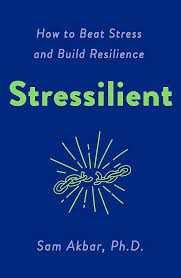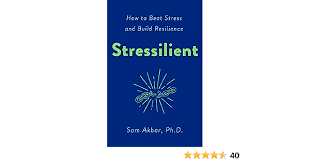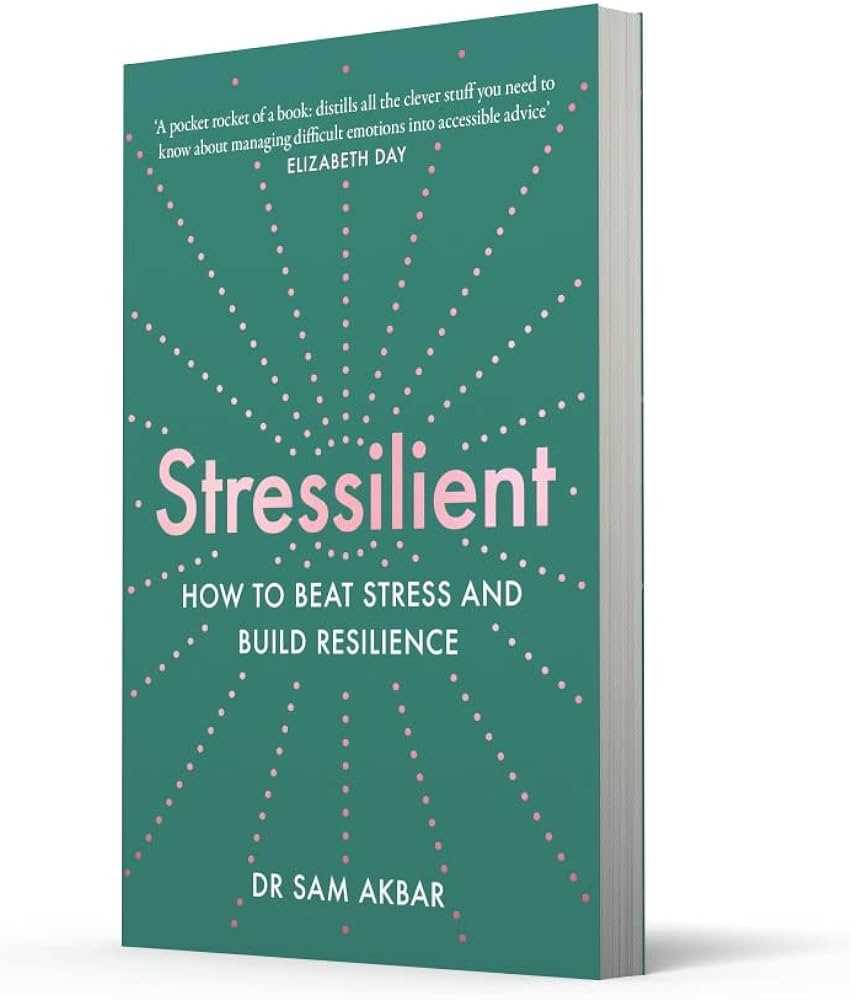
Welcome to Stressilient, the ultimate guide to beating stress and building resilience. In today’s fast-paced and demanding world, stress has become a common part of our daily lives. Whether it’s work pressure, relationship issues, or financial worries, stress can have a negative impact on our physical and mental well-being. But fear not, because this guide is here to show you how to not only beat stress, but also build the resilience needed to thrive in the face of adversity.
Resilience is the ability to bounce back from difficult situations and adapt to change. It is a skill that can be learned and developed, and this guide will show you how. By understanding the causes and effects of stress, you will be able to implement effective strategies to manage and reduce it. From mindfulness techniques to exercise and self-care practices, we will explore a wide range of tools and methods to help you build resilience and lead a happier, healthier life.
But why is it so important to build resilience? Well, resilience not only helps us to cope with stress, but it also enables us to thrive in the face of challenges. Instead of being overwhelmed by difficulties, resilient individuals are able to adapt and grow from them. They possess a positive mindset, strong problem-solving skills, and the ability to maintain their well-being even in the most stressful situations.
So, if you’re ready to take control of your stress levels and build resilience, dive into Stressilient and discover the powerful strategies that will transform your life. From understanding the science behind stress to implementing practical techniques, this guide will equip you with the knowledge and tools needed to beat stress and build resilience like never before. Get ready to unlock your potential and live a stress-free, resilient life!
Section 1: Understanding Stress

In order to beat stress and build resilience, it is crucial to first understand what stress is and how it affects us. Stressilient is all about providing you with the knowledge and tools to effectively manage stress and cultivate resilience.
Stress is a natural response to a perceived threat or demand. It can be triggered by various factors, such as work pressure, relationship issues, financial difficulties, or even major life changes. When we experience stress, our body releases stress hormones, such as cortisol and adrenaline, which prepare us for the “fight or flight” response.
While stress is a normal part of life, chronic or excessive stress can have detrimental effects on our physical and mental well-being. It can lead to a range of symptoms, including headaches, fatigue, irritability, difficulty concentrating, and sleep disturbances. Prolonged stress can also weaken our immune system and increase the risk of developing chronic conditions, such as heart disease and depression.
Building resilience is essential for effectively managing stress. Resilience refers to our ability to bounce back from challenges and adapt to adversity. By developing resilience, we can better cope with stress and maintain our well-being even in the face of difficult situations.
- Recognize your stress triggers: Identifying the specific situations or events that trigger stress can help you better prepare and manage your response.
- Practice stress management techniques: There are various techniques that can help reduce stress, such as deep breathing exercises, mindfulness meditation, physical activity, and engaging in hobbies or activities that bring you joy.
- Build a support network: Having a strong support system of friends, family, or professionals can provide you with the emotional support and guidance needed to navigate stressful situations.
- Take care of your physical health: Prioritizing self-care activities, such as getting enough sleep, eating a balanced diet, and exercising regularly, can help strengthen your resilience and better equip you to handle stress.
By understanding stress and actively working to build resilience, you can effectively beat stress and lead a more balanced and fulfilling life.
The Effects of Stress on the Body
Stress can have a profound impact on the body, affecting both physical and mental health. Understanding the effects of stress is crucial in order to beat it and build resilience.
1. Increased heart rate: When stressed, the body releases stress hormones that cause the heart to beat faster. This can lead to high blood pressure and an increased risk of heart disease.
2. Weakened immune system: Prolonged stress can suppress the immune system, making it harder for the body to fight off infections and illnesses.
3. Digestive problems: Stress can disrupt the normal functioning of the digestive system, leading to issues such as stomach aches, diarrhea, and constipation.
4. Muscle tension: Stress can cause muscles to tense up, leading to headaches, back pain, and overall body aches.
5. Sleep disturbances: Stress can interfere with sleep, making it difficult to fall asleep, stay asleep, or achieve restful sleep. This can further exacerbate stress and negatively impact overall well-being.
6. Mental health issues: Chronic stress can contribute to the development of mental health disorders such as anxiety and depression. It can also worsen existing mental health conditions.
7. Weight gain or loss: Stress can disrupt appetite and eating patterns, leading to weight gain or loss. Emotional eating or loss of appetite are common responses to stress.
8. Skin problems: Stress can worsen skin conditions such as acne, eczema, and psoriasis. It can also cause the skin to appear dull and aged.
9. Cognitive difficulties: Chronic stress can impair cognitive function, affecting memory, concentration, and decision-making abilities.
10. Reduced resilience: Prolonged exposure to stress can decrease resilience, making it harder to cope with future stressors. Building resilience is essential in order to effectively manage stress and maintain overall well-being.
Understanding the effects of stress on the body is the first step in developing strategies to beat stress and build resilience. By implementing stress management techniques, such as exercise, mindfulness, and social support, individuals can reduce the negative impact of stress and improve their overall health and well-being.
Identifying the Sources of Stress
Stress is a common part of life, but it doesn’t have to control us. In order to build resilience and effectively manage stress, it’s important to first identify the sources of stress in our lives. By understanding what causes stress, we can take proactive steps to reduce its impact and build a more stressilient life.
There are many potential sources of stress, both external and internal. External sources can include work-related pressures, financial difficulties, relationship problems, and major life changes. Internal sources of stress can include negative self-talk, unrealistic expectations, and perfectionism.
One way to identify the sources of stress is to keep a stress journal. This involves writing down the events, situations, and thoughts that trigger stress throughout the day. By keeping track of these triggers, we can start to see patterns and identify the common sources of stress in our lives.
Another helpful technique is to pay attention to our physical and emotional reactions to different situations. Notice when you start to feel tense, anxious, or overwhelmed. This can provide valuable clues about the sources of stress in your life.
It’s also important to consider how we cope with stress. Do we turn to unhealthy habits like overeating or excessive alcohol consumption? Or do we have healthy coping mechanisms in place, such as exercise, meditation, or talking to a trusted friend or therapist?
By taking the time to identify the sources of stress in our lives, we can begin to develop strategies to effectively manage and reduce stress. Building resilience is a process, but by understanding how stress impacts us and taking proactive steps to build resilience, we can create a more balanced and stress-free life.
The Link Between Stress and Mental Health
Stress is a common experience that we all face at some point in our lives. Whether it’s due to work, relationships, or other life challenges, stress can have a significant impact on our mental health. Understanding the link between stress and mental health is crucial in order to effectively beat stress and build resilience.
Stressilient, a comprehensive guide to beating stress and building resilience, provides valuable insights into how stress affects our mental well-being. By recognizing the connection between stress and mental health, we can take proactive steps to manage and reduce stress levels.
Chronic stress can lead to a variety of mental health issues, including anxiety and depression. When we are under constant stress, our bodies release stress hormones that can disrupt the balance of chemicals in our brains. This imbalance can contribute to the development of mental health disorders.
Fortunately, there are ways to build resilience and mitigate the negative effects of stress on our mental health. Developing healthy coping mechanisms, such as exercise, relaxation techniques, and seeking support from loved ones, can help us better manage stress and reduce its impact on our mental well-being.
| Steps to Beat Stress and Build Resilience: |
|---|
| 1. Recognize the signs of stress and their impact on mental health. |
| 2. Practice self-care and prioritize your well-being. |
| 3. Engage in stress-reducing activities, such as exercise and meditation. |
| 4. Seek support from friends, family, or a mental health professional. |
| 5. Create a healthy work-life balance to minimize stress. |
| 6. Develop positive thinking patterns and practice gratitude. |
By implementing these strategies, we can build resilience and effectively beat stress, ultimately improving our mental health and overall well-being. Stressilient provides a comprehensive guide to help individuals navigate the challenges of stress and develop the necessary skills to build resilience.
Section 2: Managing Stress
Resilience is the ability to bounce back from adversity and overcome challenges. It is an essential skill to have in today’s fast-paced and demanding world. Stressilient is a comprehensive guide that will teach you how to build resilience, beat stress, and lead a more fulfilling life.
So, how can you build resilience and manage stress effectively? Here are some key strategies:
| 1. Identify the sources of stress | Recognize the factors that contribute to your stress levels. This could be work-related pressure, personal relationships, financial concerns, or health issues. |
| 2. Develop healthy coping mechanisms | Find healthy ways to cope with stress, such as exercise, meditation, deep breathing techniques, or engaging in hobbies that bring you joy and relaxation. |
| 3. Prioritize self-care | Make self-care a priority in your life. Take time to rest, eat well, get enough sleep, and engage in activities that rejuvenate and recharge you. |
| 4. Build a support network | Surround yourself with supportive and positive people who can provide emotional support and guidance during challenging times. |
| 5. Practice mindfulness | Develop mindfulness techniques to stay present and focused, reducing anxiety and stress. This can include meditation, journaling, or practicing gratitude. |
| 6. Set realistic goals | Avoid overwhelming yourself by setting realistic and achievable goals. Break larger tasks into smaller, more manageable steps. |
| 7. Seek professional help if needed | If stress becomes overwhelming and starts to interfere with your daily life, don’t hesitate to seek help from a mental health professional. |
By implementing these strategies, you can effectively manage stress, build resilience, and lead a more balanced and fulfilling life. Stressilient provides you with the tools and techniques to navigate life’s challenges with confidence and strength.
Developing Healthy Coping Mechanisms
In order to build resilience and effectively manage stress, it is important to develop healthy coping mechanisms. Coping mechanisms are strategies and behaviors that we use to deal with stress and adversity. They can help us to navigate difficult situations and maintain our well-being.
Here are some tips on how to develop healthy coping mechanisms:
- Identify your stress triggers: Take the time to reflect on what situations or events tend to cause you stress. By understanding your triggers, you can better prepare yourself to cope with them.
- Practice self-care: Make sure to prioritize self-care activities that help you relax and recharge. This could include things like exercise, meditation, spending time in nature, or engaging in hobbies that bring you joy.
- Seek support: Don’t be afraid to reach out to loved ones or professionals for support. Talking to someone about your stress can help you gain perspective and find solutions.
- Manage your time effectively: Poor time management can contribute to stress. Set realistic goals, prioritize tasks, and break them down into smaller, more manageable steps.
- Practice mindfulness: Mindfulness involves being fully present in the moment and non-judgmentally observing your thoughts and feelings. It can help to reduce stress and increase resilience.
- Develop healthy coping strategies: Find healthy ways to cope with stress, such as deep breathing exercises, journaling, or engaging in creative outlets.
- Take care of your physical health: A healthy body can better handle stress. Make sure to eat a balanced diet, get regular exercise, and prioritize sleep.
- Practice gratitude: Cultivating a sense of gratitude can help shift your focus from stress to the positive aspects of your life. Consider keeping a gratitude journal or expressing gratitude to others.
By incorporating these strategies into your daily life, you can develop healthy coping mechanisms that will help you effectively manage stress and build resilience. Remember, stressilient is a journey, and it takes time and practice to develop these skills.
Creating a Stress-Relief Plan
To beat stress and build resilience, it is important to have a stress-relief plan in place. This plan should consist of various strategies and techniques that you can turn to when you are feeling overwhelmed or stressed.
Here are some steps to help you create your own stress-relief plan:
- Identify your stress triggers: Take some time to reflect on what situations or events tend to cause you stress. This could be anything from work deadlines to family conflicts. Understanding your triggers can help you develop strategies to manage and mitigate them.
- Practice self-care: Self-care is crucial for managing stress and building resilience. Make sure to prioritize activities that help you relax and recharge, such as exercise, meditation, or spending time in nature.
- Reach out for support: Don’t be afraid to ask for help when you need it. Reach out to friends, family, or a therapist who can offer support and guidance during stressful times.
- Develop healthy coping mechanisms: Find healthy ways to cope with stress, such as journaling, practicing deep breathing exercises, or engaging in hobbies that bring you joy.
- Create a routine: Establishing a daily routine can provide structure and stability, which can help reduce stress. Make sure to include time for relaxation, exercise, and self-care activities in your routine.
- Set boundaries: Learn to say no to tasks or commitments that will overwhelm you. Setting boundaries is essential for protecting your mental and emotional well-being.
- Practice mindfulness: Mindfulness is a powerful tool for managing stress. Take time each day to focus on the present moment and cultivate a sense of gratitude and awareness.
Remember, creating a stress-relief plan is a personal process. Experiment with different strategies and techniques to find what works best for you. By taking proactive steps to manage stress, you can build resilience and live a more stress-free life.
Practicing Mindfulness and Meditation
To build stressilient resilience and beat stress, it is important to incorporate mindfulness and meditation practices into your daily routine. These practices help to calm the mind, reduce anxiety, and improve overall well-being.
Mindfulness involves being fully present in the moment, without judgment or attachment to thoughts and emotions. By practicing mindfulness, you can develop a greater awareness of your thoughts and feelings, allowing you to respond to stress in a more calm and controlled manner.
Meditation is a powerful tool for reducing stress and promoting relaxation. By taking time each day to sit quietly and focus on your breath or a specific mantra, you can train your mind to let go of stress and find inner peace. Regular meditation practice can also improve concentration, enhance self-awareness, and increase feelings of gratitude and compassion.
To incorporate mindfulness and meditation into your daily routine, consider the following tips:
- Schedule dedicated time each day for mindfulness and meditation practice. Start with just a few minutes and gradually increase the duration as you become more comfortable.
- Find a quiet and comfortable space where you can sit or lie down without distractions.
- Focus on your breath, observing the sensation of each inhale and exhale. If your mind wanders, gently bring your attention back to your breath.
- Experiment with different meditation techniques, such as guided visualizations, body scans, or loving-kindness meditations, to find what works best for you.
- Consider using mindfulness apps or online resources to support your practice. These can provide guided meditations and reminders to help you stay consistent.
- Remember that mindfulness and meditation are skills that require practice. Be patient with yourself and try not to judge your experiences or progress.
By incorporating mindfulness and meditation into your daily routine, you can build stressilient resilience and develop the tools to beat stress and improve your overall well-being.
Section 3: Building Resilience

Resilience is the key to overcoming stress and becoming stressilient. But how do you build resilience in the face of adversity?
Firstly, it’s important to understand that resilience is not about avoiding stress altogether. Stress is a natural part of life, and it’s impossible to completely eliminate it. Instead, resilience is about learning how to effectively manage and cope with stress.
One way to build resilience is to develop a strong support system. Surround yourself with positive and supportive people who can offer guidance and encouragement during difficult times. Having a network of friends, family, or even a therapist can provide a valuable source of emotional support.
Another important aspect of building resilience is taking care of your physical and mental health. This includes getting enough sleep, eating a balanced diet, and engaging in regular exercise. Taking time to relax and engage in activities that bring you joy can also help to reduce stress and build resilience.
Additionally, it’s important to cultivate a positive mindset. Focus on your strengths and accomplishments, and practice self-compassion. Remind yourself that setbacks and challenges are a normal part of life, and that you have the ability to overcome them.
Finally, resilience is built through experience. The more you face and overcome challenges, the stronger and more resilient you become. Embrace opportunities for growth and learning, and don’t be afraid to step outside of your comfort zone.
By actively working on building resilience, you can beat stress and become stressilient. Remember, resilience is not something you are born with, but rather a skill that can be developed and strengthened over time.
Understanding the Concept of Resilience
Resilience is a key attribute in today’s fast-paced and often stressful world. It refers to the ability to bounce back from challenging situations and adapt to change. Building resilience is essential for maintaining mental and emotional well-being, as well as achieving success in various aspects of life.
Stressilient, a combination of “stress” and “resilient,” is a term used to describe individuals who have developed a high level of resilience. Understanding how to build resilience and beat stress is crucial for anyone looking to thrive in the face of adversity.
Resilience is not something that people are born with; it is a skill that can be learned and developed over time. By cultivating certain habits and adopting a positive mindset, individuals can enhance their resilience and better navigate the challenges that life throws their way.
One way to build resilience is by developing a strong support network. Surrounding yourself with positive and supportive people can provide a sense of belonging and help you overcome obstacles. Additionally, practicing self-care and engaging in activities that bring joy and relaxation can contribute to building resilience.
It is important to recognize that resilience does not mean being unaffected by stress or never experiencing setbacks. Instead, it means having the ability to adapt and recover quickly when faced with adversity. Resilient individuals are able to view challenges as opportunities for growth and learning, rather than as insurmountable obstacles.
In conclusion, understanding the concept of resilience is crucial for anyone seeking to build a stressilient mindset. By developing the skills and mindset necessary to bounce back from challenges and adapt to change, individuals can enhance their well-being and achieve success in all areas of life.
Developing a Growth Mindset

In order to build resilience and beat stress, it is important to develop a growth mindset. A growth mindset is the belief that abilities and intelligence can be developed through dedication and hard work. This mindset allows individuals to view challenges as opportunities for growth and to embrace failure as a stepping stone towards success.
Here are some strategies to help develop a growth mindset:
- Embrace challenges: Instead of avoiding difficult tasks, approach them with a positive attitude and see them as an opportunity to learn and grow.
- View failure as a learning experience: Rather than being discouraged by failure, see it as a chance to learn from mistakes and improve.
- Believe in the power of effort: Understand that effort and hard work are key factors in achieving success. Embrace the process of learning and understand that progress takes time.
- Seek feedback and learn from others: Be open to feedback and constructive criticism. Use it as a tool for self-improvement and growth.
- Stay motivated and persistent: Even when faced with setbacks and obstacles, maintain a positive attitude and keep pushing forward.
By developing a growth mindset, individuals can build resilience to stress and overcome challenges with confidence. This mindset allows for continuous learning and personal growth, leading to a more stressilient and resilient life.

I am Patrina de Silva, a psychologist and mental health blogger in Sri Lanka. After obtaining psychology degrees from the University of Colombo and Monash University, I returned home to work as a counselor while also starting the popular blog “Pressy but Happy” to provide advice on psychological issues. Over the past decade, my empathetic articles have made my blog a leading mental health resource in the country. In addition to writing, I maintain a private therapy practice, frequently volunteer counseling time, and conduct seminars, driven by my passion for destigmatizing mental illness and educating the public on the mind-body connection. I strive to be an influential voice in my field through my compassionate approach.
